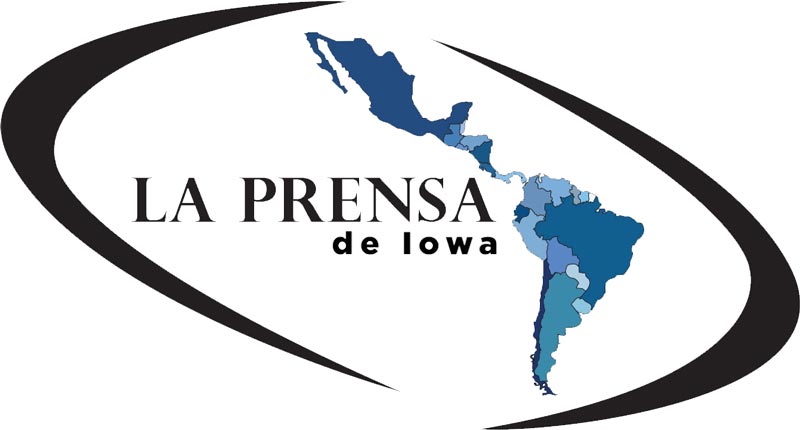Trabajadores migrantes agrícolas y estacionales: Una población invisible en el sistema de salud
/Cada año, miles de trabajadores migrantes agrícolas y de temporada vienen del Sur a Iowa para proporcionar a los propietarios de tierras locales de Iowa ayuda y cuidado agrícola. Sin embargo, estos trabajadores a menudo son maltratados y descuidados, especialmente en términos de atención médica. Foto Unsplash.
Victoria Reyna-Rodríguez
LA PRENSA IOWA
Como uno de los estados con mayor producción de cultivos en la nación, los agricultores de Iowa dependen de trabajadores agrícolas migrantes y de temporada de todo el mundo para ayudar a alimentar a nuestro estado y país. Pero estos trabajadores agrícolas migrantes y de temporada no siempre reciben la protección, la atención o la ayuda que necesitan.
Proteus es una organización sin fines de lucro que brinda a los trabajadores agrícolas y sus familias atención médica asequible, asistencia educativa y capacitación laboral, según su sitio web.
Daniel Hoffman-Zinnel, director ejecutivo de Proteus, dijo que Proteus ha estado en Iowa específicamente desde 1979.
Daniel Hoffman-Zinnel presidente de Proteus Inc., organización sin lucros que sirve Iowa, Nebraska e Indiana.
"Nuestra visión es bastante simple", dijo Hoffman-Zinnel, "mejorar la vida de los trabajadores agrícolas."
La mayoría de las personas que vienen a los Estados Unidos como trabajadores agrícolas migrantes y de temporada, tienen una visa H-2A, que es un programa de visa de no inmigrante que permite a los empleadores estadounidenses emplear a trabajadores agrícolas temporales, dónde y cuándo los trabajadores estadounidenses no están disponibles para realizar el trabajo.
Los empleadores pueden solicitar un cierto número de trabajadores agrícolas con visa H-2A, pero primero deben demostrar que han tratado de contratar primero a trabajadores estadounidenses.
“El verano pasado tuvimos más de 4,000 trabajadores con visa H-2ª en el estado de Iowa”, dijo Hoffman-Zinnel. "A veces es el empleador el que contrata directamente, o trabajarán con contratistas o líderes de cuadrilla que trabajan para las cuadrillas o los trabajadores".
Hoffman-Zinnel también dijo que, por lo general, Proteus ve a la mayoría de los trabajadores con visas H-2A que vienen de México, pero se espera que este verano vean a trabajadores agrícolas migrantes y temporales que vienen de lugares tan lejanos como Sudáfrica.
Proteus también es un centro de salud calificado a nivel federal y tiene un modelo de prestación de atención médica único en el que los pacientes pueden acceder a la atención en una de sus tres clínicas físicas, o incluso se pueden enviar clínicas temporales directamente al lugar donde se encuentran los trabajadores agrícolas. Proteus también se asociará con iglesias y otras organizaciones comunitarias cercanas a los trabajadores agrícolas para brindar atención y "eliminar tantas barreras como sea posible", dijo Hoffman-Zinnel.
Si bien Proteus solo puede brindar atención primaria, también tiene memorandos de entendimiento con otros proveedores de atención médica y puede programar citas, referencias e incluso proporcionar transporte e interpretación para esas visitas. Hoffman-Zinnel dijo que Proteus es también un programa de cupones y puede ayudar a pagar todos o parte de esos servicios con un cupón.
Pero, para los trabajadores migrantes, existen muchos más obstáculos para la atención médica que el transporte, también tienen las barreras del idioma y el dinero.
Claudia Corwin, MD, MPH, Kimberly Dukes, PhD y sus colegas han estado realizando un estudio de investigación sobre la salud y la atención médica de los trabajadores migrantes de Iowa.
Claudia Corwin, Hospital de la Universidad de Iowa y Clínicas Especialista en Medicina del Trabajo y Asistente Clínica Catedrática de Medicina Interna e investigadora principal de investigación.
Refiriéndose al historial médico de los trabajadores migrantes, Dukes dijo “Uno de los grandes problemas que veo es que hay una falta de continuidad en la atención medica mientras viajan.” Entonces, además de los otros desafíos que están experimentando los trabajadores migrantes [...], también están viajando, por lo que a menudo no pueden llevar con ellos sus documentos de atención médica o registros de salud. Al mismo tiempo que no pueden obtener recetas médicas debido a los límites estatales."
Corwin también mencionó que es importante darse cuenta de que el acceso a la atención no siempre es un acceso real.
“Por ejemplo, los trabajadores migrantes a menudo se encuentran en áreas y lugares con los que realmente no están familiarizados”, dijo Corwin. "Si no es falta de familiaridad con la región, hay falta de confianza con personas y profesionales que no conocen, barreras del idioma una vez que llega a un proveedor de atención médica o institución de atención médica, y luego la capacidad de comunicarse con su familia."
Si está solo en Iowa, tiene un problema y llega a un proveedor de atención médica, eso es una cosa. Pero a menudo es difícil comunicar información entre el médico, un trabajador agrícola temporal migrante y su familia, especialmente con las barreras del idioma. Corwin dijo que también es importante tener en cuenta que las barreras del idioma también siguen siendo un problema "enorme", especialmente en Iowa.
Por estas razones, los trabajadores agrícolas migrantes y de temporada se han convertido lamentablemente en una población invisible en el sistema de salud. Cuando llegó el COVID-19, no existía una estrategia a nivel nacional o estatal para vacunar a la población. Muchos de los trabajadores siguen sin vacunar.
“Es una población difícil de vacunar. Son móviles, a menudo pasan desapercibidos, no son un grupo de muy alto perfil,” dijo Corwin. “Por eso es intrínsecamente difícil para nosotros crear un programa de vacunación para ellos. Sin embargo, es una cuestión de prioridad estatal [...] y, lamentablemente, es posible que no hayan sido priorizados en la medida en que muchos de nosotros pensamos que deberían haber sido."
Para Dukes, ella dice que vacunar y cuidar a los trabajadores agrícolas migrantes y de temporada es importante simplemente porque son personas, y debemos preocuparnos por las personas. Pero también tenía otros niveles de razonamiento.
Kimberly Dukes, Cuidados de la salud de la Universidad de Iowa Profesor asistente de investigación de Medicina Interna y codirector de investigación.
“Incluso si fueras una persona que pensaba que esto era menos prioritario, la salud de los migrantes, a nivel económico y sistemático, estas son las personas que están cultivando los alimentos que consume Estados Unidos, los están enviando, los están cultivando, lavarlo, empacarlo,” dijo Dukes. "Entonces, si no nos ocupamos de estos trabajadores, tampoco nos ocupamos de la comida de los estadounidenses.”
Dukes dijo que si bien, los trabajadores migrantes son invisibles de muchas maneras a escala nacional, no deberían serlo, especialmente por lo cruciales que son para nosotros [los Estados Unidos].
"Creo que, en cierto modo, no nos estamos esforzando lo suficiente, ni a nivel estatal ni nacional", dijo Dukes.
Corwin mencionó que el Departamento de Salud Pública de Iowa brindó apoyo a los trabajadores agrícolas durante la pandemia, el cual consistió en realizar pruebas del virus COVID-19 en todo el estado, dicho esfuerzo fue en colaboración con Proteus. Sin embargo, en todo el pais, muy pocos, incluido Iowa, tienen legislación que garantice la protección de los trabajadores agrícolas durante la pandemia.
“Definitivamente creo que debería haber como mínimo una legislación estatal para varios tipos de protección para los trabajadores agrícolas migrantes o de temporada durante emergencias de salud pública como la pandemia,” dijo Corwin.
Tanto Corwin como Dukes reconocen que hay poca información o datos conocidos sobre los trabajadores agrícolas migrantes y de temporada, especialmente en lo que respecta a la salud, la atención médica y el acceso a la atención médica.
“Una de las razones de esto es que son móviles y es difícil llegar a ellos porque no tienen tecnología actualizada, por lo que es difícil desarrollar proyectos con esta población,” dijo Corwin. "Hacer la investigación es importante porque sin estos datos no podríamos estar informados sobre cuáles son específicamente los problemas y no podemos defender a la población, en un dominio social o en un dominio político."
Sin embargo, no solo es importante poder defender estos datos e información. Sin esta información, las organizaciones como Proteus que se crearon para ayudar a los trabajadores agrícolas migrantes y de temporada ni siquiera existirían. Esta información es tan importante para que el público en general defienda una política de atención médica adecuada como lo es para los trabajadores agrícolas migrantes y de temporada para obtener la ayuda, la atención y la asistencia que necesitan y merecen.
Corwin y Dukes se propusieron recopilar estos datos trabajando directamente con trabajadores migrantes y estacionales.
“Pensamos que quizás enviar mensajes de texto podría ser una forma de involucrar a las personas en la investigación. Es algo que es móvil, la gente lleva sus teléfonos con ellos, y solo queríamos ver, ¿podemos hacer que las personas se involucren con esta investigación por mensaje de texto? " Dijo Dukes.
A los trabajadores migrantes y de temporada se les envían preguntas sobre su salud, tanto mental como física, su acceso a la atención médica tanto en Iowa como en sus lugares de origen, peligros en el lugar de trabajo como la deshidratación y la inseguridad alimentaria.
“Ha demostrado que es factible hasta ahora, la gente está interesada y está participando y está respondiendo estas preguntas. Por lo tanto, desafía algunas de las expectativas de investigación tradicionales de quiénes participarán en la investigación y cómo alcanzarlas,” dijo Dukes.
Tradicionalmente, los investigadores no hacen muchos esfuerzos para incluir poblaciones de difícil acceso en sus estudios. Pero así es como funciona mejor la investigación: cuando incluye la comunidad sobre la que está tratando de aprender.
“Los trabajadores están dispuestos a participar y reclutan a sus familiares para participar, y a sus amigos; realmente muestra que estos trabajadores están interesados, invertidos y dispuestos a colaborar con investigadores y directores de programas que están dispuestos a defenderlos,” dijo Corwin.
Corwin y Dukes también están trabajando en un proyecto de entrevistas con personas migrantes en Iowa. A los trabajadores agrícolas migrantes y estacionales se les preguntará sobre su experiencia durante la pandemia, qué hicieron sus lugares de trabajo para protegerlos, cómo quieren pensar sobre la prevención de infecciones en el futuro y la ayuda que necesitan para hacerlo, su acceso a la atención médica, vacunaciones COVID-19 y su actitud hacia las vacunas.
“Este es solo el comienzo de lo que esperamos sea más sistemático, con suerte a nivel nacional algún día”, dijo Dukes.
Corwin dijo que ella misma y todo el equipo están comprometidos con este proyecto y la promoción.
“Cuando se habla con las legislaturas y los responsables de la toma de decisiones, siempre quieren números, siempre quieren datos. Si no son números, quieren cotizaciones,” dijo Corwin. "Quieren información real y estamos comprometidos a recopilar esa información y mover un poco la aguja para estos trabajadores."
Translation
An invisible population in the healthcare system: migrant and seasonal farmworkers
Each year, thousands of migrant and seasonal farmworkers come from the Global South to Iowa to provide local Iowan land owners with agricultural help and care. Yet, these workers are often mistreated and neglected, especially in terms of healthcare. Photo from Unsplash.
Victoria Reyna-Rodríguez
LA PRENSA IOWA
As one of the top crop-producing states in the nation, Iowa farmers rely on migrant and seasonal farmworkers from all over the world to help feed our state and country. But, these migrant and seasonal farm workers don’t always receive the protection, care or help they need.
Proteus is a nonprofit organization that provides agricultural workers and their families with affordable healthcare, education assistance and job training, according to their website.
Daniel Hoffman-Zinnel, CEO of Proteus said that Proteus has been in Iowa specifically since 1979.
“Our vision is pretty simple,” said Hoffman-Zinnel, “To make a better life for farmworkers.”
Most individuals who come as migrant and seasonal farmworkers are on an H-2A visa, which is a non-immigrant visa program that allows U.S. employers to fill temporary agricultural jobs where and when U.S. workers are not available.
Employers can apply for a certain number of H-2A visa workers, but have to first show their due-diligence for having tried to find U.S. workers first.
“Last summer we had over 4,000 H-2A visa workers, I believe, in the state of Iowa,” said Hoffman-Zinnel. “Sometimes it’s the employer that’s directly hiring, or they’ll work with contractors or crew leaders who work for the crews or the workers.”
Hoffman-Zinnel also said that Proteus usually sees most H-2A visa workers coming from Mexico, but this summer they are expected to see migrant and seasonal farmworkers coming from as far as South Africa.
Proteus is also a federally qualified health center, and has a unique healthcare delivery model where patients can access care at one of their three brick and mortar clinics, or temporary clinics can even be sent directly to where the farmworkers are located. Proteus will also partner with churches and other community-based organizations near farmworkers to provide care and, “eliminate as many barriers as possible,” Hoffman-Zinnel said.
While Proteus can only provide primary care, they also have memorandums of understanding with other healthcare providers and can make appointments, referrals and even provide transportation and interpretation for those visits. Hoffman-Zinnel said Proteus is also a voucher program and can help pay for all or part of those services with a voucher.
But, for migrant workers there are many more obstacles to healthcare rather than just transportation, language barriers and money.
Claudia Corwin, MD, MPH, Kimberly Dukes, PhD and their colleagues have been conducting a research study on the health and healthcare of Iowa’s migrant workers.
“One of the big issues [for migrant workers] that I see is there’s a lack of continuity of care while traveling,” said Dukes. “So in addition to the other challenges migrant workers are experiencing [...] they’re also traveling, so they’re not able to take their healthcare with them often. You don’t have something that can travel with you, health records or be able to get prescriptions across state boundaries.”
Corwin also mentioned that it is important to realize access to care isn’t always real access.
“For example, migrant workers are often in areas and locations that they’re really unfamiliar with,” said Corwin. “If it’s not lack of familiarity with the region, there’s lack of trust with people and professionals they don’t know, language barriers once you get to a healthcare provider or health care institution, and then the ability to communicate with your family.”
If you’re alone in Iowa, have an issue and actually make it to a healthcare provider, that’s one thing. But it’s often difficult to communicate information between the doctor, a migrant seasonal farm worker and their family, especially with language barriers. Corwin said it’s also important to note that language barriers are also still a “huge” issue, especially in Iowa.
For these reasons, migrant and seasonal farmworkers have become an invisible population in the healthcare system. When COVID-19 hit, there was no national or state-level strategy on vaccinating the population. Many of the workers still remain unvaccinated.
“It is a difficult population to vaccinate. They’re mobile, often flying under the radar, not a very high-profile group,” said Corwin. “So it is intrinsically difficult for us to create a vaccination program for them. However, it is a matter of state priority [...] and unfortunately they may not have been prioritized to the extent that many of us think they should have been.”
For Dukes, she says vaccinating and taking care of migrant and seasonal farmworkers is important simply because they are people, and we should care about people. But, she also had other levels of reasoning.
“Even if you were a person who thought this was less of a priority, migrant health, on an economic and systematic level, these are the people who are growing the food that the United States eats, they are shipping it, they are growing it, washing it, packing it,” said Dukes. “So, if we don’t take care of these workers, we also aren’t taking care of the food for the United States.”
Dukes said that while migrant workers are invisible in many ways on a national scale, they shouldn’t be, especially because of how crucial they are to us.
“I think, in a way, we're not trying hard enough, at a state or a national level,” Dukes said.
Corwin mentioned that there are very few states in America that have any policies at all to protect migrant and seasonal farmworkers, and Iowa is not one of them. While there are initiatives, getting them through the state legislature is a very difficult task.
“I definitely think there should be at minimum a state-based legislation for various types of protection for migrant or seasonal farm workers during public health emergencies like the pandemic,” Corwin said.
Both Corwin and Dukes acknowledge that there is little information or data known about migrant and seasonal farmworkers, especially with regard to health, healthcare and healthcare access.
“One of the reasons for this is they are mobile and they are hard to reach because they don’t have up-to-date technology, so it’s difficult to actually develop projects with this population,” said Corwin. “Doing the research is important because without this data we could not be informed on what specifically the problems are and we can’t advocate for the population, in a social domain or in a political domain.”
This data and information isn’t only important to be able to advocate, though. Without this information, organizations like Proteus that are created to help migrant and seasonal farmworkers wouldn’t even exist. This information is just as important to the general public to advocate for proper health care policy as it is to migrant and seasonal farmworkers to get the help, care and assistance they need and deserve.
Corwin and Dukes set out to collect this data by working directly with migrant and seasonal workers.
“We thought that perhaps texting may be one way to engage people with research. It’s something that’s mobile, people take their phones with them, and we just wanted to see, can we get people to engage with this research by text?” Dukes said.
The migrant and seasonal workers are sent questions about their health, both mental and physical, their access to healthcare both in Iowa and in their hometowns, workplace hazards like dehydration and food insecurity.
“It has shown it’s feasible so far, people are interested and they’re participating and they are answering these questions. So, it kind of defies some of the traditional research expectations of who will participate in research and how to reach them,” Dukes said.
Traditionally, researchers don’t make many efforts to include hard-to-reach populations in their studies. But, this is how research works best: when you include the community you’re trying to learn about.
“Workers are willing to participate and they recruit their family members to participate, and their friends from and it really shows these workers are interested, invested and willing to collaborate with researchers and program directors who are willing to advocate for them,” Corwin said.
Corwin and Dukes are also working on an interview project with migrant individuals in Iowa. The migrant and seasonal farmworkers will be asked about their experience during the pandemic, what their workplaces did to protect them, how they want to think about preventing infection in the future and what help they need to do so, their access to healthcare, COVID-19, COVID-19 vaccinations, and their attitude towards vaccinations.
“This is just the beginning of what we hope will be more systematic, hopefully at a national level someday,” Dukes said.
Corwin said herself and the entire team is committed to this project and advocacy.
“When you speak with legislatures and decision makers they always want numbers, they always want data. If not numbers, they want quotes,” said Corwin. “They want real information and we’re committed to collecting that information and moving the needle a bit for these workers.”
Daniel Hoffman-Zinnel is the CEO of Proteus Inc., a non-profit organization that serves Iowa, Nebraska and Indiana.
Claudia Corwin, University of Iowa Hospitals and Clinics Occupational Medicine Specialist and Clinical Assistant Professor of Internal Medicine and principal research investigator.
Kimberly Dukes, University of Iowa Healthcare Research Assistant Professor of Internal Medicine and co-principal research investigator.














































